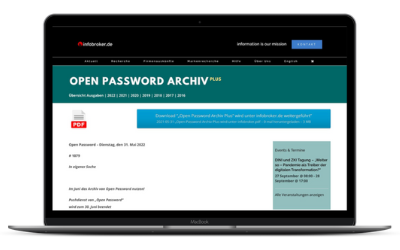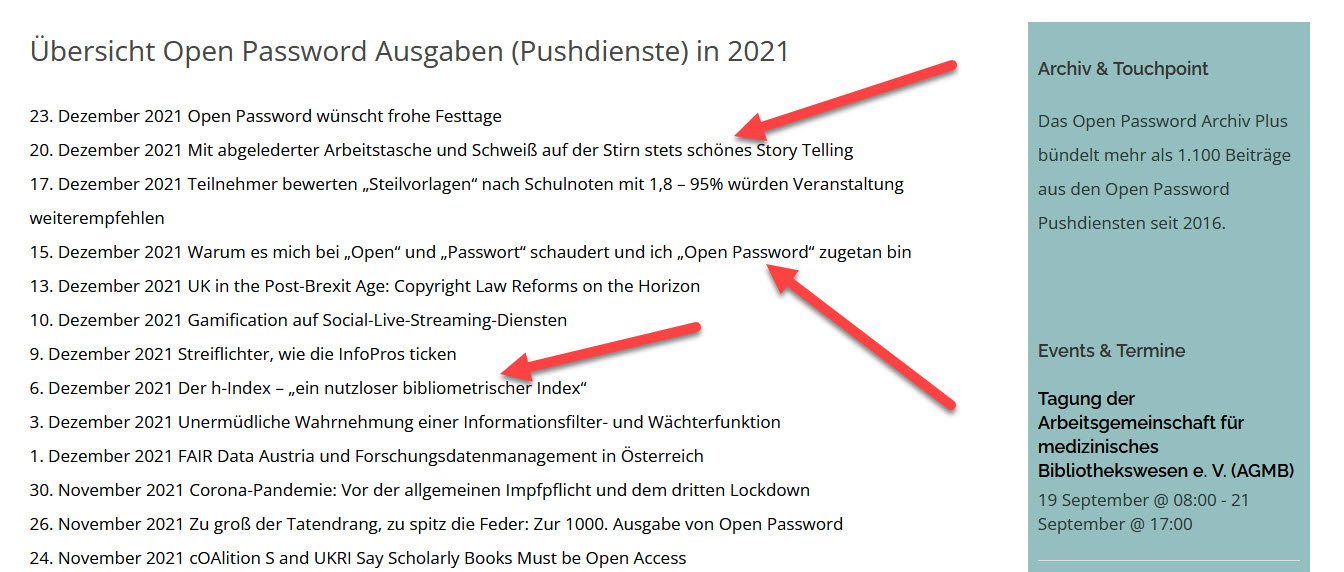Open Password – Montag, den 19. Juni 2017
# 213
London Info International – Online Information – Willi Bredemeier – Philip Ditchfield – Fake News – Brexit – Klimawandel – Donald Trump – Produktpiraterie – Künstliche Intelligenz – Informationsmärkte – Technologie – New Infotech – Open Science – Colin Steele – British Library – Wissenschaftliches Publizieren – Monographien – academicbookfuture
London Info International (1)
LII ist thematisch die Renaissance
der Online Information
Das bislang ehrgeizigste Programm
trifft den Nerv der Branche
Von Willi Bredemeier
5 – 6 Dec 2017 London Info International, im Business Design Centre, London.
London Info International ist mit einem ersten Entwurf seines Konferenzprogramms herausgekommen. Veranstalter Philip Ditchfield nennt es “our most ambitious programme to date (that) will get to the heart of the real issues facing today’s information professionals and providers”. Das ist ein sehr hoher Anspruch. Ich habe mir den Draft angesehen und finde: Im dritten Jahr seiner Existenz (gerechnet nach Konferenzauftritten) ist die LII zumindest thematisch ganz auf der Höhe ihrer Zeit und verdient zu Recht als Wiedergeburt der Online Information gesehen zu warden.
Warum haben wir eine ähnliche Veranstaltung und ein ähnlich starkes Bemühen um Branchenerkenntnis und Praxisrelevanz nicht einmal ansatzweise in Deutschland (von den mehr methodologischen Themen am ehesten abgesehen)? Allerdings müssen die Referenten zu den einzelnen Themen noch gefunden werden und ist über die Entwicklung der Ausstellung noch nichts gesagt.
Dies sind die Themenbereiche und Thesen, die mir besonders gefallen haben und den Befund aus meiner Sicht bestätige:
- Fake News, nicht allgemein diskutiert, sondern in ihrer Bedeutung für die Medien und die Nutzer
- Brexit, Klimawandel, Donald Trump und Produktpiraterie, nicht allgemein erörtert, sondern wie sie Einfluss auf die Informationsbranche nehmen
- Wie die Künstliche Intelligenz beginnt, die Informationsmärkte zu verändern
- Die neue Generation der Nutzer (“Millenials”) mit ihrem veränderten Informationskonsum und wie wir auch sie gewinnen und qualifizieren können
- “Technology is increasingly more about exploiting strategic assets than access and entitlement”, so dass sie mit einem neuen Begriff – “New Infotech” – belegt warden sollte.
- Die Zukunft der Open-Science Bewegung.
Oder anders gesagt: Es lohnt sich wieder, nach London zu fahren.
London Info International (2)
Das Konferenzprogramm
Day One – 5th December 2016
9:30 – 10:15 Opening Keynote
10:15 – 11:15 Valuing truth in the age of fake – plenary session. 2017 has seen the word ‘fake’ enter common parlance and truth has appeared to become increasingly contingent in public life. Although truth and reliability have always been implicit in our industry, issues around verification and reproducibility are now under question across the whole information chain. This session assesses the impact of fake on publishers and information users alike and asks is it time for the information industry to shift its thinking and approach?
11:30 – 12:30 Open Science, open futures? The open movement is creating the conditions for the evolution of new models for scientific research. This session will review how open initiatives are emerging at the interface between the political mandates of institutions and the changing expectations of researchers
.11:30 – 12:30 Birth of the new infotech. For content owners, brokers and aggregators, technology is increasingly more about exploiting strategic assets than access and entitlement. With semantic enrichment at the heart of the new infotech, this session will look at its impact on the way information is presented and consumed.
12:30 – 14:00 Lunch
14:00 – 14:15 Disruptor Zone – Heat 1. Start-up companies and ‘disruptors’ are changing the face of the information industry and quickly responding to technology changes, user behaviour and customer needs. Our Disruptor Zone contestants will present their business concept in short, timed presentations. Attendees will vote on each presentation, and combined with the judges input, will determine a winner to go onto the Final.
14:15 – 15:15 Welcome to the New Impact. How do we evaluate differing notions of impact? Impact factors continue to be the primary mark used to evaluate career progression, journal quality and funding outputs, however today’s generations of researchers are also comfortable with altmetrics and the ability to drive their own impact. How will impact evolve in the near future?
14:15 – 15:15 The AI and machine learning renaissance – a revolution in waiting? The long-heralded impact of AI is beginning to transform information markets. Beyond the transformation of content, AI technology is restating the relationship between authors, consumers and brokers. This session will look at how AI is being used to address usage, impact and audience engagement.:3
15:30 – 16:15 Afternoon Keynote
Day Two – 6th December 2016
9:15 – 10:00 Opening Keynote
10:00 – 11:00 Facing the realities of uncertainty – plenary session. In this panel session, our speakers will assess the impact on the information industry of the political and economic events that have dominated our news agenda in 2017. From Brexit to Trump and from climate change to piracy, our panel will assess the game changing new realities the information world faces.
11:15 – 11:30 Disruptor Zone – Heat 2. In our second Disruptor Zone heat contestants will present their business concept in short, timed presentations. Attendees will the votes on each presentation, and combined with the judges input, will determine a winner to go onto the Final.
11:30 – 12:30 New tribes, changing realities. The rise to prominence in the workplace of millennials and Generation C tribes is shifting the expectations of information users. In this session, we’ll look at the demographics and discuss how these new tribes are impacting information consumption.
11:30 – 12:30 Embracing the new digital – skills, techniques and tools. Customer experience experts in online teams are using a growing set of sophisticated tools and techniques to understand user behavior and outcomes. This session will feature those in the information industry who are adapting them to suits their needs, with their tips on how you can practically apply them to your work.
12:30 – 13:30 Lunch
13:30 – 14:30 Educating the new end-user – strategies to reach millennials and Generation C. How can information suppliers and professionals lead their users to higher value information use when the prevailing climate is fragmentation and personalised compilation? This session will review case studies for strategic deployment of information for the new generations of users.
13:30 – 14:30 Meet the up-starts – the publishing start-ups challenging the status quo. An emerging generation of publishing start-ups, driven by the new rules of digital commerce, is having a profound impact on our industry. In this session, we showcase some of them and ask them to talk through their approach and thinking.
14:45 – 15:00 Disruptor Zone Final. Our Disruptor Zone competition reaches its climax with finalists presenting their newest and most innovative products, platforms and content.
15:00 – 15:45 Closing Keynote
Briefe
Noch mehr wissenschaftliche Bücher,
aber Auflagen sinken unter 200
Die weiteren verlegerischen Herausforderungen
Colin Steele (<Colin.Steele@anu.edu.au>) hat uns den Project Report „Academic Book of the Future“ im Aufrage des AHRC und der British Library vom 13. Juni (<https://academicbookfuture.org/end-of-project-reports-2/>) empfohlen. Entscheidende Stellen sind aus seiner Sicht:
„The incentives for authors to produce traditional kinds of books are strong, arising from perceptions of the weight given to such books in assessments of the qualities of individual scholars and departments…. There are incentives also for publishers to maintain their output of titles, as they seek to sustain their reputations by building strong lists in relevant subject areas; and to spread risks and overheads. The result is that, in many of the major disciplines and sub-disciplines in the arts and humanities, more titles are published than even the most assiduous scholar could hope to read.
And with library budgets for book purchasing at best static in real terms, and retail sales declining, the business case for the publication of individual titles is often now based on print sales per title of 200 or fewer. Further falls will call into question the case for publishing individual titles, and indeed the value and viability of the whole book publishing enterprise. Nevertheless the perceived incentives for academics to publish monographs are so strong that only concerted action by all stakeholders, and at senior level, can begin to address the problems they are now generating. …
High-quality content is at the heart of what publishers provide for authors and readers. But the challenges they already face – to sustain their reputation for the scholarly quality and presentation of the titles they publish; to develop new tools, service offers, and models; to ensure their titles are effectively marketed and distributed; and to ensure they generate the revenues to develop and sustain their services for the future – will become more difficult over the next decade.“
Anzeige

FAQ + Hilfe



